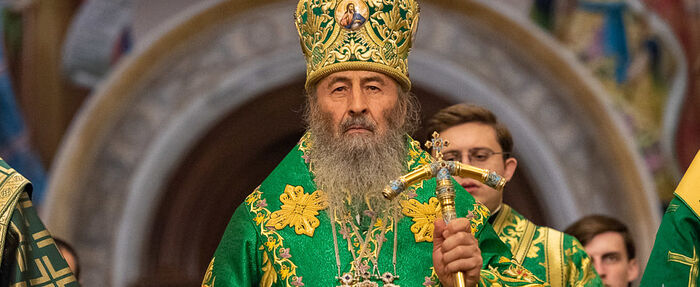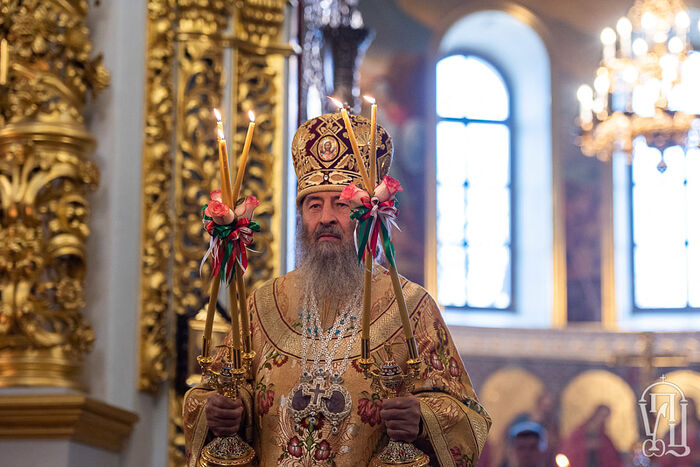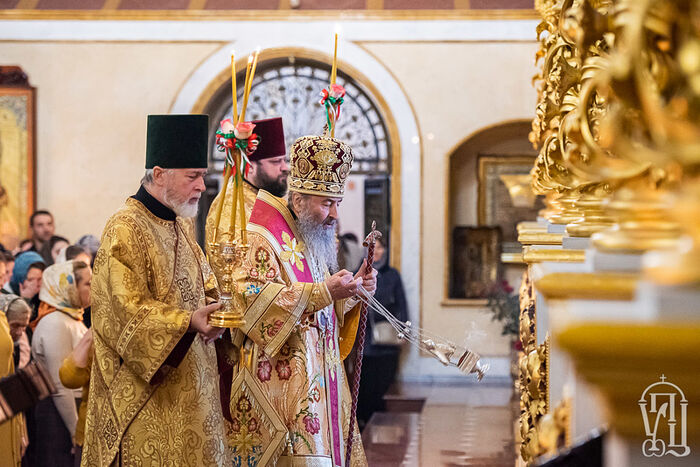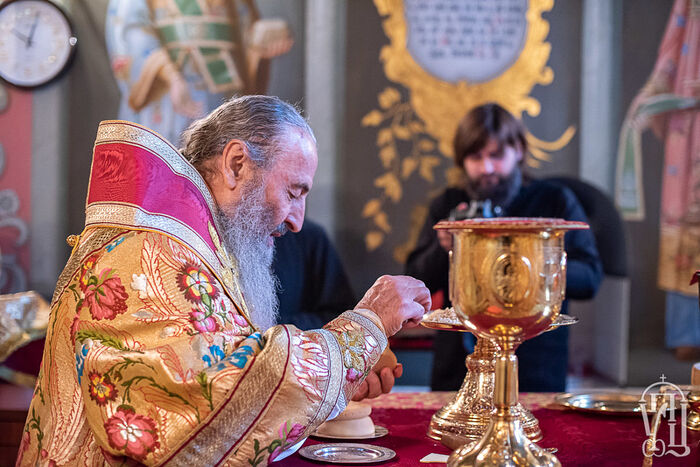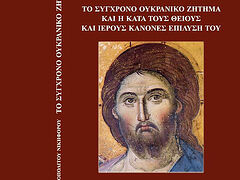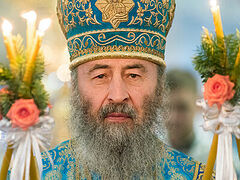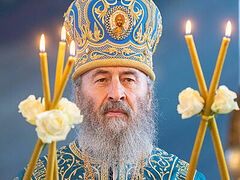How can we restore unity to world Orthodoxy and overcome the schism? What do the schism of 1054 and the current Church rupture have in common? What is needed to restore Eucharistic communion between the Phanar and the Russian Orthodox Church? Is there a threat to Ukrainian Orthodoxy from the Muslim world? How should the Church and its clergy carry out their mission today, and how do today’s trials affect the spiritual life of the faithful?
The Information-Education Department of the Ukrainian Orthodox Church recently published an interview on these topics with His Beatitude Metropolitan Onuphry of Kiev and All Ukraine originally published in the UOC’s official magazine, “Pastor and Flock.”
—Your Beatitude, people often compare the break in Eucharistic communion between the Churches due to the actions of the Phanar with the Great Schism of 1054, when Rome broke away from the Church. Is this former unity of the Orthodox Church possible, or is this actually a new schism?
—If you make a spiritual analysis of the break in Eucharistic communion between the Eastern and Western parts of the one Orthodox Church that occurred in 1054 and the break in Eucharistic communion that occurred in 2019 between the fullness of the Russian Orthodox Church and the Church of Constantinople, we will find much in common.
The spiritual break in 1054 was preceded by Church discussions about the purity of the holy faith. The East and West hotly debated about the heresies that appeared in the Christian world and, oddly enough, in most cases, it was the bishops of the Western part of the Church who defended the purity of the faith. The Eastern part was stricken by the heresies of the heresiarchs Patriarch Nestorius of Constantinople (condemned by the Third Ecumenical Council), Archimandrite Eutychus of Constantinople (condemned by the Fourth Ecumenical Council), and the Emperors of Constantinople Heraclius (Monothelitism) and Leo III the Isaurian (Iconoclasm). From this spiritual division in the one Church began the administrative and political division. The East and West moved further and further away from each other, and what happened in 1054 was simply the conclusion of a wicked process of division that had begun long before.
In our times, what happened in 2019 also had its spiritual background—the propensity of some important representatives of the holy Church of Constantinople for-free thinking and liberalism, who have repeatedly tried to justify and accept laws that disagree with the Holy Gospel, which the secular world actively tries to implement in our lives today.
The disputes between the Russian Orthodox Church and Constantinople have taken place on various levels—from the sidelines to highest tribunes. This spiritual relaxation from Constantinople in preserving the purity of the holy Orthodox faith is the root cause of the schism that occurred in 2019. I think that Constantinople’s attempts to give to Caesar not only what is Caesar’s, but also what is God’s, caused the fall of Constantinople and the destruction of the vast Byzantine Empire. And today, the ecclesiastical authorities of Constantinople are ready to accept any custom and law forbidden by God that the world offers, just to return Constantinople (now Istanbul) to its former glory, and to regain the authority the Church had in the heyday of the Byzantine Empire.
Theoretically, the break in Eucharistic communion, which occurred in 2019, could be healed. But for that, the respected Patriarch of Constantinople should behave with all as the first in honor and equal in authority. Unfortunately, His Holiness acts as the first both in honor and authority, but this is alien to the Orthodox spirit of conciliarity, by which the Orthodox Church has lived and lives. And what’s even more said, is that there is no indication to be seen for an Orthodox change in this tendency toward estabishing an Orthodox papacy.
—In Turkey, they turned Agia Sophia and the church in Chora Monastery into mosques, and Turkey is financing the construction of a large-scale mosque in Kiev. Is there a connection between these events, and do you see any threats for Ukrainian Orthodoxy from the Muslim world?
—Indeed, the ancient Church of Agia Sophia and the church in the former Chora Monastery have been turned into mosques. It’s a spiritual tragedy, and we express our sympathy and compassion to His Holiness the Patriarch of Constantinople. We have not only prayed and are praying about it, but we also expressed our protest in an address to the Turkish Parliament. Unfortunately, it hasn’t brought any positive results yet.
At the same time, the position of the His respected Holiness the Patriarch of Constantinople, who did not express a single word of protest against what happened, is incredibly surprising. It’s rather strange and incomprehensible.
There is a spiritual expression: Because of our sins, the Lord does not spare the holy things. I don’t want to reproach anyone, but for the sake of the love of truth I will say that as the revolution and destruction of the holy places in the Russian Empire occurred because of our ecclesiastical-spiritual distortions, so the fall of the Byzantine Empire occurred because of the incorrect spiritual leadership that the Byzantine Church exercised in relation to its country and its people.
If the respected leaders of the Church of Constantinople couldn’t bring spiritual benefit and preserve their country and their people, how can they bring spiritual benefits and preserve those countries and peoples where they are interfering in their spiritual affairs?
About the funding of the construction of an Islamic mosque in Kiev, I’ll say that this is an alarm bell, calling us to look for and correct our ecclesiastical-spiritual mistakes and shortcomings that exist in the personal life of every one of us. Someone may object and say: You’re talking about correcting Church mistakes, but you’re calling for the correction of human mistakes. The fact is that when we speak about the Church, in this case, we mean the human component of the Church. The Church consists of angels, the saints who are in Heaven, and those living on Earth; in other words, the Church consists of two parts: the Heavenly Church and the earthly Church. The Heavenly, or Triumphant Church, is holy and infallible, and the earthly, or Militant Church, which we are a part of, can err and sin, but it can also be corrected. The only way to improve the quality of the human component of the earthly Church is for every one of us to make an effort to make ourselves more morally and spiritually perfect. The means for improving your personal spiritual life are prayer, fasting, good deeds, humility, patience, forgiveness, and love. May the Lord help us.
—Many churches are being built in our Church today, and there is active social work being carried out. But statistics show that despite all our efforts, the number of active Church members is no more than five to seven percent, and it’s not really changing. What should priests do—focus on spiritual work with those who are already in the community, or try to attract as many people as possible to their church?
—Indeed, the percentage of active Church members in Ukraine is not high, and can be increased. But to do this, we have to pay spiritual attention to ourselves. This isn’t self-love—it’s humility. A man with self-love looks at himself with admiration, but a humble man looks at himself with reproach. Humble attention to ourselves is critical attention—attention that seeks our flaws, shortcomings, and weaknesses, and tries to amend them through repentance.
A priest should first and foremost try to fervently and patiently labor over his own spiritual prosperity, and then hearken to and spiritually help his flock; and when all of this is going well, then he can do everything possible to missionize among the non-Churched people. But to be fair, I must say that not every priest can be a missionary in his ministry, but every priest should be a missionary with his life; that is, he should live so that people see the spiritual fruits of love, joy, peace, longsuffering, gentleness, goodness, mercy, faith, meekness, and temperance (cf. Gal. 5:22) in his example of a pious life. If non-Churched people see this in a priest, sooner or later they will enter within the Church’s yard to acquire these spiritual fruits for themselves—because everyone wants these fruits. Parishioners also become such spiritual missionaries if the priest constantly nourishes them and carefully guides them along the path of a pious life.
—The introduction of electronic passports, the supersedure of cash, the appearance of digital identifiers: Many things indicate that in the coming decades, human life (including religious life) may fall under the complete control of the state. How will all of this affect the spiritual life of the faithful? Will the Church become weaker or stronger?
—Indeed, the changes in the life of humanity in recent times testify that we are entering a new historical era, which in Church language is called apocalyptic. This is spoken about in the New Testament, especially in the book of the Revelation of St. John the Theologian. This era brings people new challenges and trials, but those who try to live with God will be under a special cover of grace that will strengthen them to bear all his difficulties with dignity.
Where God is, there is blessedness, and whoever tries to cleave to God will be blessed even in the most serious trials. The most powerful spiritual weapon for a man in the coming trials is prayer and humility. He who calls on the name of the Lord will be saved. I think that in terms of numbers, the Church will become weaker, but in terms of the spiritual life of the faithful, the Church will become stronger.
—Many have refused to participate in the Mysteries during the pandemic out of fear of getting sick. Is it possible to get sick through the Mysteries and how important is it for us to participate in them, regardless of the position of the world?
—We’re talking about communing of the Holy Mysteries of the Body and Blood of our Lord Jesus Christ, which He gives us for our spiritual purification and for eternal life. Christ is the Fountain of life; He is our life—the meaning of our life and its beauty. Whoever partakes of the Holy Body and Blood of Christ receives the power of eternal life. The fear that some people have of getting infected when communing of the Holy Mysteries in the Church is in vain. The power of life that enters a man when he communes of the Holy Mysteries of Christ cannot be overcome by any virus or disease. We receive Communion unto the healing of soul and body.
But there is one reason why someone can get sick or even die from Holy Communion—when they commune with proud madness, cynically, contemptuously, or to work some kind of sorcery, or with some other wicked intentions. People get sick and even die from communing this way.
But if someone approaches the Holy Mysteries, discerning the Lord’s Body (cf. 1 Cor. 11:29), that is, aware that he is the dust of the earth, and approaches his Creator, Who is the Fount of life and immortality and Whose love wants to unite men to eternal, blessed life, then such a man communes unto the remission of sins and unto life eternal.
However, there are some Orthodox who have not come to the measure of this understanding and are overcome by fear of being infected from the single spoon the priest uses to distribute Holy Communion. A priest should condescend to such parishioners and make a concession to their infirmity, communing them with a disinfected spoon.
This does not contradict the sacred laws of Divine love, which descended to our infirmity, bringing to Earth the Son of God, the Second Hypostasis of the Holy Life-giving Trinity, in order to redeem, purify, sanctify, and raise us fallen men up to Heaven. God condescends to us, and we should condescend to one another.
Participating in the Holy Mysteries of the Church, especially in the Mystery of the Holy Eucharist, not only strengthens us and gives us a pledge of eternal life, it gives us the strength to endure, to forgive, and to love, that is, to do what adorns a man and what the world so needs today.

